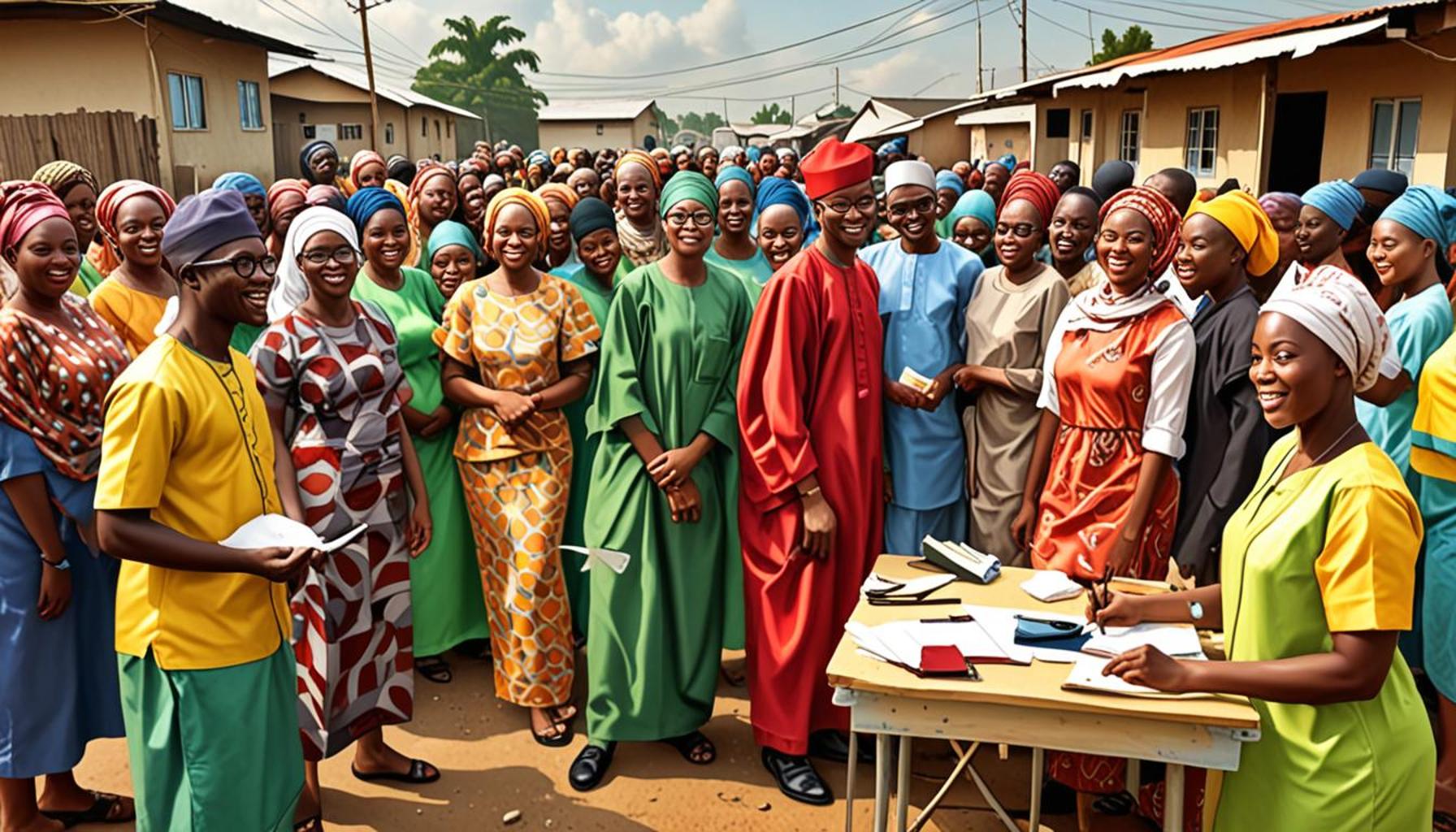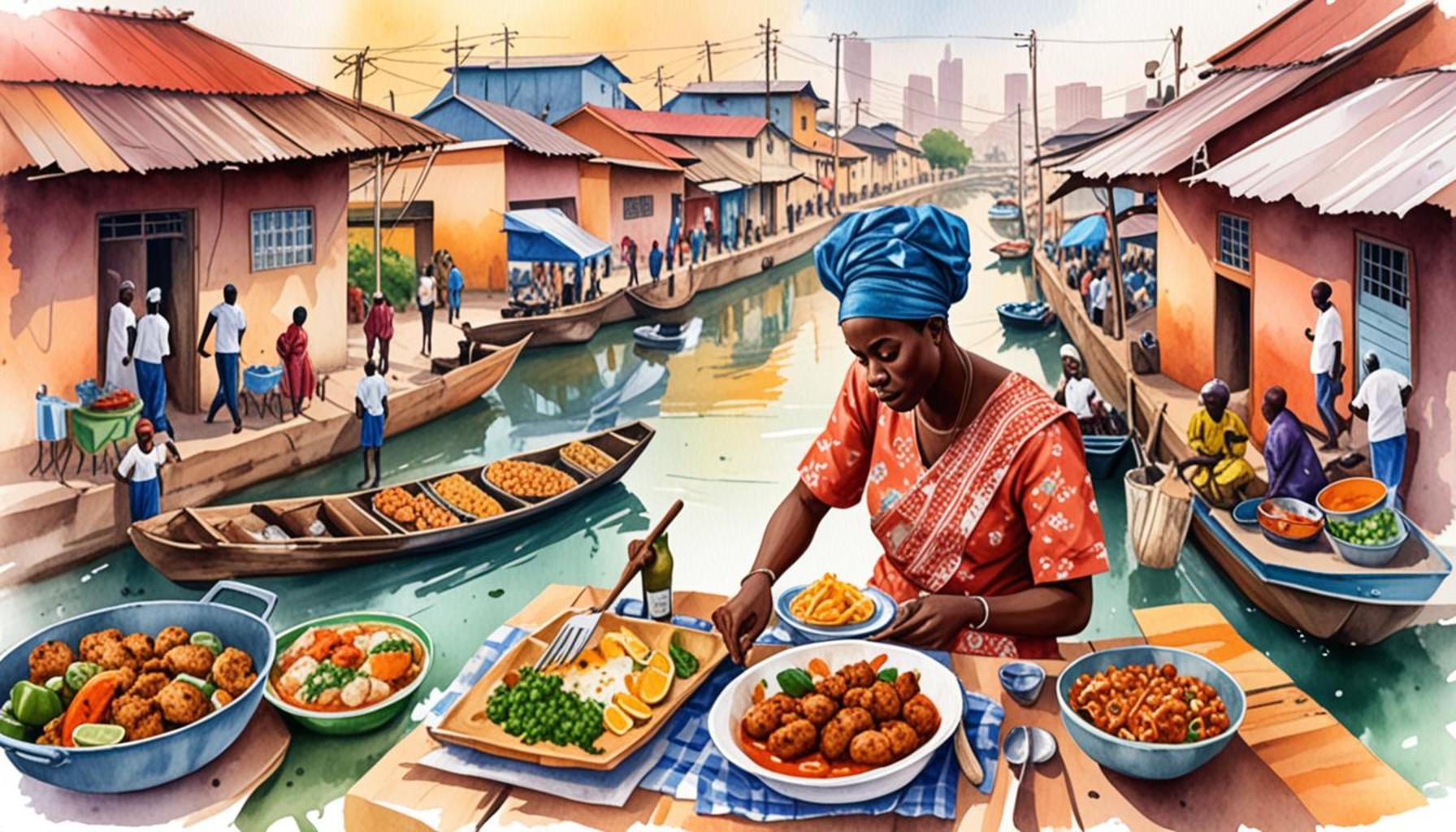Encounters with the Community: Volunteer and Social Interaction Routes in Nigeria

Understanding the Landscape of Community Engagement in Nigeria
Nigeria stands as a mosaic of ethnicities, languages, and traditions, creating an environment ripe for community engagement and social interaction. This diversity is not merely a backdrop but a catalyst for volunteerism and cooperative efforts that aim to address a myriad of social issues and foster unity. Through these engagements, the enduring values of teamwork and collaboration are brought to life, illustrating the rich social fabric that holds Nigerian communities together.
Community engagement emerges in several dynamic forms, each contributing to the well-being of society:
- Local volunteer programs play a crucial role in addressing essential areas such as education, healthcare, and environmental sustainability. For instance, initiatives like Teach For Nigeria aim to bridge the educational gap by placing passionate individuals in underserved schools, where they not only teach but also inspire students and their families.
- Religious and cultural festivals serve as vibrant gatherings that reinforce community bonds. Events such as the Osun-Osogbo Festival in Osun State or the Durbar Festival in Northern Nigeria unite diverse groups in celebration, promoting shared cultural heritage and fostering an atmosphere of togetherness.
- Grassroots movements emerge as powerful forces advocating for social change. Organizations like the Nigerian Youth Climate Network actively engage young people in environmental advocacy and education, galvanizing efforts for sustainable practices and community awareness.
These engagements open up pathways for social interaction, offering deeper insights into the Nigerian experience. They can lead to:
- Shared values and experiences that transcend individual backgrounds. The common struggles and triumphs faced by communities often create a sense of belonging and solidarity among participants.
- Opportunities for skills development that not only benefit the community but also enhance the personal capabilities of volunteers. Skills ranging from leadership to project management can be honed through active participation in local initiatives.
- Connections that lead to lasting friendships and networks of support. These relationships can be invaluable in personal and professional life, as individuals often rely on their community ties for guidance and camaraderie.
As Nigeria continues to navigate a landscape marked by social challenges such as poverty, inequality, and healthcare crises, active participation in local communities becomes indispensable. Through volunteerism and social initiatives, the potential to create meaningful change is undeniable. This exploration into the realm of community engagement invites readers to uncover the profound ways in which they can contribute to society, highlighting that every effort counts toward making a positive impact in the lives of others.
LEARN MORE: This related article may interest you

The Multifaceted Nature of Volunteerism in Nigeria
Volunteerism in Nigeria takes many forms, each interwoven with the country’s rich cultural tapestry and communal ethos. As the nation faces various challenges—from educational disparities to healthcare shortages—the spirit of voluntarism becomes a beacon of hope and resilience. Individuals from diverse backgrounds come together, driven by a shared commitment to improvement and social welfare.
One of the most significant areas of volunteer engagement is in education. Programs like Teach For Nigeria embody the essence of service by placing motivated educators in under-resourced schools across the country. These volunteers not only impart knowledge but also uplift communities by awakening aspirations in children and inspiring families to prioritize education. In addition, initiatives like the Nigerian Red Cross Society mobilize volunteers to provide essential health services, disaster response, and first aid training, addressing pressing needs in various regions.
Moreover, Nigeria’s agricultural landscape has also seen a rise in volunteer-led initiatives. Food for All Africa, for instance, connects volunteers with local farms and urban communities to redistribute surplus food and reduce hunger. These efforts foster sustainability by addressing food waste while enhancing food security—an essential goal in a country where hunger remains a critical issue.
Bridging Communities Through Cultural Engagement
Cultural and religious festivals present another vibrant arena for volunteer engagement. Events such as the Osun-Osogbo Festival not only reinforce ethnic pride but also draw volunteers from across the nation to celebrate their shared heritage. These gatherings provide opportunities for people to engage in traditional practices and collective celebrations, promoting social cohesion. Similarly, the Durbar Festival in Northern Nigeria showcases rich cultural displays and fosters unity among the diverse ethnic groups residing in the area, ultimately encouraging collaboration for social causes.
Beyond the festivities, grassroots movements are making waves throughout the country. Organizations like the Nigerian Youth Climate Network exemplify how young Nigerians are stepping up to advocate for environmental sustainability. Through community outreach, advocacy campaigns, and educational workshops, these passionate youths are mobilizing their peers to address environmental challenges. Their efforts highlight the importance of fostering a sense of responsibility towards the planet and inspire collective action.
- Mobilizing Educators: Initiatives like Teach For Nigeria place dedicated individuals in schools to uplift educational standards.
- Providing Health Services: Organizations like the Nigerian Red Cross Society engage volunteers in essential health interventions and disaster response.
- Sustainable Agricultural Practices: Projects such as Food for All Africa connect volunteers with food distribution efforts to combat hunger and food waste.
- Cultural Celebrations: Festivals serve as platforms for community bonding and enrichment, bolstering shared identity.
- Environmental Advocacy: Grassroots organizations engage youth in initiatives that promote sustainability and climate awareness.
Each of these community encounters illustrates the multifaceted nature of volunteerism in Nigeria. They bring individuals together and transform lives, embodying the belief that collective action can drive significant change. As volunteerism continues to evolve, it strengthens the connections between people and their communities, creating a ripple effect of positive change that inspires hope and fosters resilience across the nation.
| Advantage | Description |
|---|---|
| Community Engagement | Fostering strong relationships while connecting with diverse community members. |
| Social Awareness | Encouraging awareness of social issues through volunteer opportunities and collaborations. |
Engaging with the community through volunteerism in Nigeria presents numerous advantages that go beyond mere goodwill. The theme “Encounters with the Community: Volunteer and Social Interaction Routes in Nigeria” emphasizes the importance of community engagement. This initiative invites participants to learn about various cultures and develop a deeper understanding of Nigeria’s social fabric. By volunteering, individuals not only contribute to tangible improvements in their communities but also forge strong relationships with fellow volunteers and local residents, creating a sense of belonging. These connections are pivotal in promoting social cohesion and fostering an environment of inclusivity. Moreover, volunteering exposes participants to a multitude of social issues that affect different segments of society, leading to heightened awareness and understanding. With each encounter, volunteers encounter challenges faced by vulnerable populations, sparking conversations and actions that can drive lasting change. Through community engagements, Nigerians and volunteers alike can create a ripple effect, inspiring others to partake in social responsibility initiatives while simultaneously gaining immense personal fulfillment. The transformative power of these interactions cannot be underestimated, as they mold individuals into advocates for positive change within their communities.
LEARN MORE: This related article may interest you
Empowering Through Social Initiatives
As the heart of Nigeria beats vibrantly with the pulse of its communities, social initiatives bloom, enhancing the fabric of societal interactions. Beyond traditional volunteer efforts, this dynamic landscape is rich with modern engagement strategies aimed at tackling pressing social issues. Organizations like Women in Management, Business and Public Service (WIMBIZ) are championing women’s empowerment by creating opportunities for mentorship, skills acquisition, and networking. Their initiatives not only equip women with the necessary tools for economic independence but also foster a supportive community where shared experiences lead to mutual growth.
The engagement doesn’t stop there; youth empowerment programs are also reshaping how Nigerians connect and collaborate. The Nigerian National Youth Service Corps (NYSC) plays a notable role by deploying thousands of graduates to communities across the nation, where they engage in community development projects while cultivating social bridges among diverse groups. This experience not only broadens participants’ perspectives but also enriches the communities they serve through initiatives in education, health, and rural infrastructure.
Technology-Driven Community Interaction
In recent years, technology has emerged as a transformative force in volunteerism and social interaction in Nigeria. Platforms such as NGO Hub Africa facilitate collaboration among various nonprofit organizations, volunteers, and activists. By providing tools for networking, project funding, and mentorship, these platforms enhance the capacity for impactful community engagement. Furthermore, social media campaigns have proven instrumental for awareness-raising, mobilizing support for causes such as #EndSARS, which saw widespread youth participation and galvanized civic activism.
Digital literacy initiatives are also on the rise, as various organizations seek to provide tech training to underprivileged youths. For instance, DigitalYouth Nigeria offers training sessions to empower young Nigerians with skills in coding, digital marketing, and entrepreneurship. These efforts create pathways for employment and innovation, thereby lifting communities and broadening the scope of social interaction.
Inter-Community Collaborations and Partnerships
The interconnectedness of Nigerian communities has given rise to significant inter-community partnerships aimed at fostering unity and cooperation. Programs like the Interfaith Peace Initiative bring together religious leaders from diverse faiths to collaborate on social issues that transcend religious boundaries, such as poverty alleviation and conflict resolution. Such collaborations are crucial, especially in regions where inter-ethnic and inter-religious tensions exist, as they build a framework for dialogue, understanding, and peacebuilding.
Additionally, initiatives like the Nigeria Child Rights Act Coalition illustrate the power of collaboration across various sectors to protect vulnerable children. The coalition comprises legal professionals, child rights activists, and social workers who work together to raise awareness of children’s rights, ensuring that the welfare of the younger generation remains a priority.
- Women Empowerment: Organizations like WIMBIZ focus on providing women with the necessary skills and networks for success.
- Youth Engagement: NYSC volunteers bring diverse talents to community development, connecting with broader societal issues.
- Technology Initiatives: Platforms such as NGO Hub Africa enhance collaborations and mobilize resources for impactful projects.
- Diverse Training: DigitalYouth Nigeria’s tech literacy training empowers young Nigerians for professional opportunities.
- Interfaith Action: Initiatives promoting cooperation among different religious groups tackle pressing social issues and foster peace.
This ever-evolving landscape of volunteerism and social engagement emphasizes the intricate web of connections formed within Nigerian communities. As the nation continues to grapple with multifaceted challenges, these vibrant encounters serve to not only uplift individuals but also lay the groundwork for a collective advancement, fostering a society that champions resilience and compassion.
RECOMMENDED: Check out this similar article
Conclusion: The Fabric of Community Togetherness
The journey through the landscape of volunteerism and community interaction in Nigeria reveals a tapestry woven from resilience, camaraderie, and shared aspirations. As explored, organizations like Women in Management, Business and Public Service (WIMBIZ) exemplify the significant role of empowering women in fostering holistic community growth. Similarly, the contribution of Nigerian National Youth Service Corps (NYSC) demonstrates how youth engagement can invigorate community development and cultivate lasting relationships.
Technology has undoubtedly catalyzed this evolution, offering new platforms such as NGO Hub Africa that streamline resources and connect diverse efforts toward positive change. The rise of digital literacy programs, spearheaded by initiatives like DigitalYouth Nigeria, not only equips the younger generation with essential skills but also expands their vision of what is possible within their communities. Moreover, the power of inter-community collaboration, as seen in initiatives like the Interfaith Peace Initiative, provides a beacon of hope amidst social fragmentation, fostering dialogue and cooperation across cultural divides.
Ultimately, the encounters witnessed through volunteerism and social interaction in Nigeria stand as a testament to the strength of communal bonds. These avenues promote not just individual empowerment but also create the societal framework necessary for collective advancement. As citizens from diverse backgrounds unite under shared goals, they pave the way for a future rich with opportunity and understanding. The call to action for Nigerians is clear: engage actively, connect meaningfully, and continue to build the vibrant community networks that will sustain progress and compassion for generations to come.


